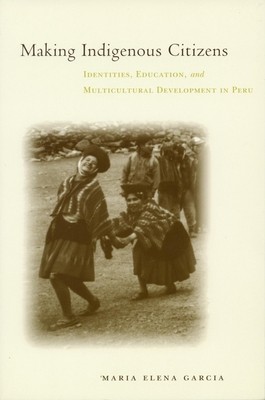
- We will send in 10–14 business days.
- Author: Maria Elena GarcÃa
- Publisher: Stanford University Press
- ISBN-10: 0804750157
- ISBN-13: 9780804750158
- Format: 15.6 x 23.4 x 1.3 cm, softcover
- Language: English
- SAVE -10% with code: EXTRA
Reviews
Description
Set against conventional views of Peru as a place where indigenous mobilization has been absent, this book examines the complex, contentious politics between intercultural activists, local Andean indigenous community members, state officials, non-governmental organizations, and transnationally-educated indigenous intellectuals. It examines the paradoxes and possibilities of Quechua community protests against intercultural bilingual education, official multicultural policies implemented by state and non-state actors, and the training of authentic indigenous leaders far from their home communities.
Focusing on important local sites of transnational connections, especially in the highland communities of Cuzco, and on an international academic institute for the study of intercultural bilingual education, this book shows how contemporary indigenous politics are inextricably and simultaneously local and global. In exploring some of the seeming contradictions of Peruvian indigenous politics, Making Indigenous Citizens suggests that indigenous movements and citizenship are articulated in extraordinary but under-explored ways in Latin America and beyond.
EXTRA 10 % discount with code: EXTRA
The promotion ends in 15d.22:50:40
The discount code is valid when purchasing from 10 €. Discounts do not stack.
- Author: Maria Elena GarcÃa
- Publisher: Stanford University Press
- ISBN-10: 0804750157
- ISBN-13: 9780804750158
- Format: 15.6 x 23.4 x 1.3 cm, softcover
- Language: English English
Set against conventional views of Peru as a place where indigenous mobilization has been absent, this book examines the complex, contentious politics between intercultural activists, local Andean indigenous community members, state officials, non-governmental organizations, and transnationally-educated indigenous intellectuals. It examines the paradoxes and possibilities of Quechua community protests against intercultural bilingual education, official multicultural policies implemented by state and non-state actors, and the training of authentic indigenous leaders far from their home communities.
Focusing on important local sites of transnational connections, especially in the highland communities of Cuzco, and on an international academic institute for the study of intercultural bilingual education, this book shows how contemporary indigenous politics are inextricably and simultaneously local and global. In exploring some of the seeming contradictions of Peruvian indigenous politics, Making Indigenous Citizens suggests that indigenous movements and citizenship are articulated in extraordinary but under-explored ways in Latin America and beyond.


Reviews